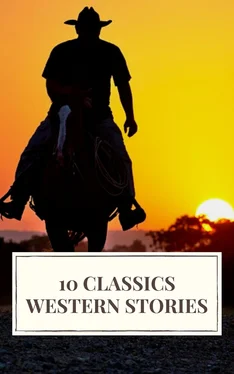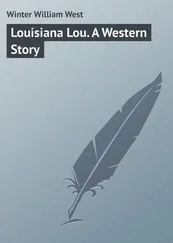“Nope,” replied Hardy, and continued his work in silence.
“Cookin’ for the outfit?” queried Swope, edging in at the door.
“Nope,” replied Hardy.
“Well, who the hell air ye cookin’ fer then?” demanded Swope, drawing nearer. “’Scuse me if I pry into this matter, but I’m gittin’ interested.” He paused and showed a jagged set of teeth beneath his bristling red mustache, sneeringly.
“Well, I’ll tell you,” answered Hardy easily. “I thought some white man might come along later and I’d ask him to dinner.” He fixed his eyes upon the sheepman with an instant’s disapproval and then resumed his cookery. As for Swope, his gray eyes flashed sudden fire from beneath bushy eyebrows, and then a canny smile crept across his lips.
“I used to be a white man, myself,” he said, “before I lost my soap. What’s the chance to git a bite of that bymeby?” He threw his hand out toward the pot of beef, which was sending out odors of a rich broth, flavored with onions and chili.
Hardy looked at him again, little shrimp of a man that he was, and still with disapproval.
“D’ye call that a white man’s way of entering another man’s house?” he inquired pointedly.
“Well,” temporized Swope, and then he stopped. “A man in my line of business gits in a hurry once in a while,” he said lamely. “But I’m hungry, all right,” he remarked, sotto voce .
“Yes,” said Hardy, “I’ve noticed it. But here––sit down and eat.”
The sheepman accepted the dish of beef, dipped out a spoonful of beans, broke off a slab of bread, and began his meal forthwith, meanwhile looking at Hardy curiously.
“What’s that you say you’ve noticed?” he inquired, and a quizzical smile lurked beneath his dripping mustache as he reached over and hefted the coffeepot.
“I’ve noticed,” replied Hardy, “that you sheepmen get in a hurry once in a while. You can’t stop to knock on a door so you kick it open; can’t stop to go around a ranch, so you go through it, and so on.”
“Ah,” observed Swope slyly, “so that’s what’s bitin’ you, eh? I reckon you must be that new superintendent that Jim was tellin’ about.”
“That’s right,” admitted Hardy, “and you’re Mr. Swope, of course. Well, I’ll say this for you, Mr. Swope, you certainly know how to get sheep across a river. But when it comes to getting along with cowmen,” he added, as the sheepman grinned his self-approval, “you don’t seem to stack up very high.”
“Oh, I don’t, hey?” demanded Swope defiantly. “Well, how about the cowmen? Your friend Creede gets along with sheepmen like a house afire, don’t he? Him and a bunch of his punchers jumped on one of my herders last Fall and dam’ nigh beat him to death. Did you ever hear of a sheepman jumpin’ on a cowboy? No, by Gad, and you never will! We carry arms to protect ourselves, but we never make no trouble.”
He paused and combed the coffee grounds out of his heavy red mustache with fingers that were hooked like an eagle’s talons from clutching at sheep in the cold water.
“I don’t doubt, Mr. Superintendent,” he said, with sinister directness, “that these cowmen have filled you up about what bad hombres we are––and of course it ain’t no use to say nothin’ now––but I jest want to tell you one thing, and I want you to remember it if any trouble should come up; we sheepmen have never gone beyond our legal rights, and we’ve got the law behind us. The laws of the United States and the statutes of this Territory guarantee us the right to graze our sheep on public lands and to go where we dam’ please––and we’ll go, too, you can bank on that.”
He added this last with an assurance which left no doubt as to his intentions, and Hardy made no reply. His whole mind seemed centred on a handful of beans from which he was picking out the rocks and little lumps of clay which help to make up full weight.
“Well!” challenged Swope, after waiting for his answer, “ain’t that straight?”
“Sure,” said Hardy absently.
Swope glared at him for a moment disapprovingly.
“Huh, you’re a hell of a cowman,” he grunted. “What ye goin’ to do about it?”
“About what?” inquired Hardy innocently.
“Aw, you know,” replied Swope impatiently. “How about that upper range?” He shoved back his chair as he spoke, and his eyes lit up in anticipation of the battle.
“Well,” responded Hardy judicially, “if you’ve got the legal right to go up there, and if you’re goin’ where you dam’ please, anyhow, it don’t look like I could do anything.” He paused and smiled patiently at the sheepman.
“You know very well, Mr. Swope,” he said, “that if you want to go up on that mesa and sheep off the feed we haven’t got any legal means of preventing you. But you know, too, that there isn’t more than enough feed for what cows the boys have left. If you want to go up there, that’s your privilege––and if you want to go out over The Rolls, that’s all right, too.”
“Of course you don’t give a dam’!” said Swope satirically.
“I guess you know how I feel, all right,” returned Hardy, and then he lapsed into silence, while Swope picked his teeth and thought.
“Where’d you come from?” he said at last, as if, forgetting all that had passed, his mind had come back from a far country, unbiassed by the facts.
“Over the mountains,” replied Hardy, jerking his thumb toward the east.
“Don’t have no sheep over there, do they?” inquired Swope.
“Nope, nothing but cattle and horses.”
“Ump!” grunted the sheepman, and then, as if the matter was settled thereby, he said: “All right, pardner, bein’ as you put it that way, I reckon I’ll go around.”
Chapter 7 HELL’S HIP POCKET
In the days of Ahaz, king of Judah, Isaiah the son of Amoz is reported to have seen in a vision a wolf which dwelt with a lamb, while a lion ate straw like an ox, and a weaned child put his hand in the cockatrice’s den. Equally beautiful, as a dream, was the peace at Hidden Water, where sheepman and cattleman sat down together in amity; only, when it was all over, the wolf wiped his chops and turned away with a wise smile––the millennium not having come, as yet, in Arizona.
Hardy’s wrist was a little lame, figuratively speaking, from throwing flapjacks for hungry sheep herders, and the pile of grain and baled hay in the storehouse had dwindled materially; but as the sheep came through, band after band, and each turned off to the west, stringing in long bleating columns out across The Rolls, he did not begrudge the hard labor. After Jasper Swope came Jim, and Donald McDonald, as jolly a Scottish shepherd as ever lived, and Bazan, the Mexican, who traced his blood back to that victorious general whom Maximilian sent into Sonora. There were Frenchmen, smelling rank of garlic and mutton tallow; Basques with eyes as blue and vacant as the summer skies; young Mormons working on shares, whose whole fortune was wrapped up in the one huddle of sheep which they corralled and counted so carefully; and then the common herders, fighting Chihuahuanos, with big round heads and staring eyes, low-browed Sonorans, slow and brutal in their ways, men of all bloods and no blood, lumped together in that careless, all-embracing Western term “Mexicans.”
But though they were low and primitive in mental processes, nearer to their plodding burros than to the bright-eyed sensitive dogs, they were the best who would consent to wander with the sheep through the wilderness, seeing nothing, doing nothing, knowing nothing, having before them nothing but the vision of a distant pay day, a drunk, the calabozo , and the kind boss who would surely bail them out. Ah, that was it––the one love and loyalty of those simple-minded creatures who, unfit for the hurry and competition of the great world, sold their lives by spans of months for twenty dollars and found; it was always to the boss that they looked for help, and in return they did his will.
Читать дальше












